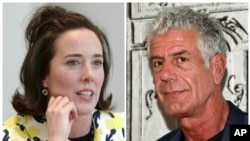Student Union
High-Profile Suicides Could Influence Students, Teens

Recent suicides of high-profile celebrities lead experts to worry that young people will copy the act of taking their own lives.
"They think, 'Well, OK, that person hung themselves from a banister using 10-foot rope,' then that might be something that they want to emulate," said Blaise Aguirre, M.D., a psychiatrist specializing in mood and personality disorders in adolescents at McLean Hospital outside Boston.
"The sensationalism can make this option seem attractive," comedian Bridget Phetasy, who has struggled with suicidal thoughts, wrote in a New York Post op-ed. "In all these cases, I've heard more details about their deaths than I care to know, and I can't help but feel like the way we're covering these deaths isn't helping."
Suicide is the second-leading cause of death among 15- to 29-year-olds around the world, according to the World Health Organization (WHO) in Geneva, and has more than doubled in the past decade. Only road traffic fatalities top suicide as the primary cause of adolescent deaths, with boys accounting for 77 percent of those deaths worldwide.
Experts say they are frustrated by the attention given to celebrity suicides, such as travel TV host Anthony Bourdain and fashion designer Kate Spade last week, and the impact on youths at risk. High-profile suicide can trigger contagion, which acts like a virus and may push others to take their lives. After the 2014 suicide of Robin Williams, a popular comedian and actor, researchers saw a nearly 10 percent increase in suicides. People grieving a suicide were 65 percent more likely to attempt to take their own life, a study from the University of London showed.
No one is sure why the contagion effect exists, Aguirre said. He said he thinks that hearing or reading about a suicide "activates neurons that are correlated with suicide" and makes suicide more acceptable to those at risk. Contagion does not influence people who are not at risk, he said.
Many experts say media about suicide amplifies contagion. The popular show 13 Reasons Why, based on a young-adult novel by Jay Asher, follows 17-year-old Clay Jensen as he listens to tapes left by his deceased classmate Hannah, explaining why she killed herself. Asher's novel was published in 2007 and made the American Library Association's list of most banned books in 2012 and again in 2017, the year the Netflix show first aired.
Critics say the show and its explicit portrayal of Hannah's suicide is irresponsible. The suicide is more graphic in the TV series than the book.
"In a person who is not at risk, it's not a dangerous show," Aguirre said. "But in a person who is at risk, it's a very dangerous show."
Nic Sheff, who wrote the episode that portrays Hannah's suicide, defended himself in a Vanity Fair op-ed.
"Facing these issues head-on — talking about them, being open about them — will always be our best defense against losing another life," he wrote. "It overwhelmingly seems to me that the most irresponsible thing we could've done would have been not to show the death at all."
The controversy remains fresh. Katrina Sheffield, a Florida mom, said the show inspired her daughter's suicide attempt in May. Her daughter sent a text during her attempt, saying that it was "taking longer" than on 13 Reasons Why, and her method was similar to Hannah's.
"I have told our daughter that instead of finding 13 reasons why — let's find 14 on why not!" Sheffield wrote. In a Facebook video, she urged parents to talk to their children about suicide.
Females are more likely to have suicidal thoughts, called ideation, although the suicide rate is almost four times higher in males. In the U.S., rates are increasing overall, reports the CDC.
Research suggests that age and race are closely correlated with self-harm statistics. Black children aged 5 to 12 are twice as likely to commit suicide as their white peers, but black teens aged 13 to 17 are 50 percent less likely to do so than white teens.
Lesbian, gay, bisexual, transgender, queer and other (LGBTQ+) students are also at high-risk — they're more than twice as likely to consider suicide and over three times more likely to attempt it than their heterosexual peers. Nearly 45 percent of transgender respondents to a Canadian survey reported that they had planned an attempt at least once.
Facebook has released a program intended to spot users at risk of suicide or self-harm based on their posts, even if no one reports it.
The World Health Organization offers a guide on reporting suicide, advising the media to be cautious "in reporting celebrity suicides."
"Don't place stories about suicide prominently, and do not unduly repeat such stories," WHO advised. It discourages describing suicide details, such as method or location.
"The more detail that you give legitimizes that way of doing it. Why not just say the person died by suicide and have that be its own talking point?" Aguirre said. Describing the suicide in detail "doesn't tell you about the underlying mental health."
American mental health advocacy groups called for increased attention to and funding for mental health issues following news last week of the death of Bourdain and Spade.
"Too many people in America do not have access to mental health services, and too often we neglect the impacts of traumatic events that sometimes fester for decades before taking people's lives," Paul Gionfriddo, president and CEO of Mental Health America, said in a statement.
"With all of us working together, and by collectively making a massive investment in suicide prevention research, resources and quality mental health care, we can, and we will, reverse the rising suicide rate," the American Foundation for Suicide Prevention wrote.
"Suicide Prevention is a social justice Issue," tweeted mental health advocate Jacob Griffin.
South African law student, writer and activist Luke Waltham called for action.
"Actively make your spaces brave ones where people, including yourself, can speak about your feelings and experiences," Waltham tweeted.
National Suicide Prevention Lifeline: 1-800-273-TALK (8255)
Join the conversation on our Facebook, Instagram, Twitter, LinkedIn and Snapchat social media discussions, thanks!
See all News Updates of the Day
- By VOA News
Competition grows for international students eyeing Yale

It’s tough to gain admission to Yale University, and it’s getting even tougher for international students as standout students from around the world set their sights on Yale.
The Yale Dale News, the campus newspaper, takes a look at the situation here.
- By VOA News
Student from Ethiopia says Whitman College culture made it easy to settle in

Ruth Chane, a computer science major from Ethiopia, writes about her experiences settling into student life at Whitman College in the U.S. state of Washington.
"The community at Whitman College made sure I felt welcomed even before I stepped foot on campus," she says.
- By VOA News
Claremont Colleges student gets a shock when she heads home to Shanghai

In The Student Life, the student newspaper for the Claremont Colleges, a consortium of five liberal art colleges and two graduate schools in Claremont, California, student Rochelle Lu writes about readjusting to her Shanghai home after spending a semester in the United States.
- By VOA News
Cedarville University aims to ease transition for international students

Cedarville University in the U.S. state of Ohio says it’s got more than 140 international students representing 44 countries.
Here, the school interviews Jonathan Sutton, director of international student services. He talks about his job and the opportunities for international students on campus.
- By VOA News
Morehouse College offers prospective students tips on applying and thriving

Morehouse College, a private, historically Black liberal arts college in the U.S. state of Georgia, offers a guide for international students interested in attending the school.
Among the tips to apply and thrive at Morehouse:
- Take advantage of the school’s orientation program
- Turn to the school’s Center for Academic Success for tutoring, support and more
- Immerse yourself in campus life via clubs and societies
- By Reuters
US reviews Columbia University contracts, grants over antisemitism allegations

The administration of President Donald Trump said on Monday it will review Columbia University's federal contracts and grants over allegations of antisemitism, which it says the educational institution has shown inaction in tackling.
Rights advocates note rising antisemitism, Islamophobia and anti-Arab bias since U.S. ally Israel's devastating military assault on Gaza began after Palestinian Hamas militants' deadly October 2023 attack.
The Justice Department said a month ago it formed a task force to fight antisemitism. The U.S. Departments of Health and Education and the General Services Administration jointly made the review announcement on Monday.
"The Federal Government's Task Force to Combat Anti-Semitism is considering Stop Work Orders for $51.4 million in contracts between Columbia University and the Federal Government," the joint statement said.
The agencies said no contracting actions had been taken yet.
"The task force will also conduct a comprehensive review of the more than $5 billion in federal grant commitments to Columbia University."
The agencies did not respond to requests for comment on whether there were similar reviews over allegations of Islamophobia and anti-Arab bias.
Columbia had no immediate comment. It previously said it made efforts to tackle antisemitism.
College protests
Trump has signed an executive order to combat antisemitism and pledged to deport non-citizen college students and others who took part in pro-Palestinian protests.
Columbia was at the center of college protests in which demonstrators demanded an end to U.S. support for Israel due to the humanitarian crisis caused by Israel's assault on Gaza. There were allegations of antisemitism and Islamophobia in protests and counter-protests.
During last summer's demonstrations around the country, classes were canceled, some university administrators resigned and student protesters were suspended and arrested.
While the intensity of protests has decreased in recent months, there were some demonstrations last week in New York after the expulsion of two students at Columbia University-affiliated Barnard College and after New York Governor Kathy Hochul ordered the removal of a Palestinian studies job listing at Hunter College.
A third student at Barnard College has since been expelled, this one related to the occupation of the Hamilton Hall building at Columbia last year.
Canada’s immigration overhaul signals global shift in student migration
From Europe to North America, nations are tightening their immigration policies. Now Canada, long seen as one of the world's most welcoming nations, has introduced sweeping changes affecting international students. The reforms highlight a growing global trend toward more restrictive immigration policies. Arzouma Kompaore reports from Calgary.
Trump administration opens antisemitism inquiries at 5 colleges, including Columbia and Berkeley

The Trump administration is opening new investigations into allegations of antisemitism at five U.S. universities including Columbia and the University of California, Berkeley, the Education Department announced Monday.
It's part of President Donald Trump's promise to take a tougher stance against campus antisemitism and deal out harsher penalties than the Biden administration, which settled a flurry of cases with universities in its final weeks. It comes the same day the Justice Department announced a new task force to root out antisemitism on college campuses.
In an order signed last week, Trump called for aggressive action to fight anti-Jewish bias on campuses, including the deportation of foreign students who have participated in pro-Palestinian protests.
Along with Columbia and Berkeley, the department is now investigating the University of Minnesota, Northwestern University and Portland State University. The cases were opened using the department's power to launch its own civil rights reviews, unlike the majority of investigations, which stem from complaints.
Messages seeking comment were left with all five universities.
A statement from the Education Department criticized colleges for tolerating antisemitism after Hamas' Oct. 7, 2023, attack on Israel and a wave of pro-Palestinian protests that followed. It also criticized the Biden administration for negotiating "toothless" resolutions that failed to hold schools accountable.
"Today, the Department is putting universities, colleges, and K-12 schools on notice: this administration will not tolerate continued institutional indifference to the wellbeing of Jewish students on American campuses," said Craig Trainor, the agency's acting assistant secretary for civil rights.
The department didn't provide details about the inquiries or how it decided which schools are being targeted. Presidents of Columbia and Northwestern were among those called to testify on Capitol Hill last year as Republicans sought accountability for allegations of antisemitism. The hearings contributed to the resignation of multiple university presidents, including Columbia's Minouche Shafik.
An October report from House Republicans accused Columbia of failing to punish pro-Palestinian students who took over a campus building, and it called Northwestern's negotiations with student protesters a "stunning capitulation."
House Republicans applauded the new investigations. Representative Tim Walberg, chair of the Education and Workforce Committee, said he was "glad that we finally have an administration who is taking action to protect Jewish students."
Trump's order also calls for a full review of antisemitism complaints filed with the Education Department since Oct. 7, 2023, including pending and resolved cases from the Biden administration. It encourages the Justice Department to take action to enforce civil rights laws.
Last week's order drew backlash from civil rights groups who said it violated First Amendment rights that protect political speech.
The new task force announced Monday includes the Justice and Education departments along with Health and Human Services.
"The Department takes seriously our responsibility to eradicate this hatred wherever it is found," said Leo Terrell, assistant attorney general for civil rights. "The Task Force to Combat Anti-Semitism is the first step in giving life to President Trump's renewed commitment to ending anti-Semitism in our schools."
- By VOA News
STEM, business top subjects for international students

The Times of India breaks down the most popular subjects for international students to study in the U.S.
STEM and business lead the pack. Read the full story here. (January 2025)
- By VOA News
Safety and visa difficulties among misconceptions about US colleges

U.S. News & World report addresses some of the misconceptions about U.S. colleges and universities, including the difficulty of getting a visa.
Read the full story here. (January 2025)
- By VOA News
Work opportunities help draw international students to US schools

US News & World Report details the three top factors in foreign students' decision to study in the U.S. They include research opportunities and the reputation of U.S. degrees. Read the full story here. (December 2024)
- By VOA News
British student talks about her culture shock in Ohio

A British student who did a year abroad at Bowling Green State University in Ohio talks about adjusting to life in America in a TikTok video, Newsweek magazine reports.
Among the biggest surprises? Portion sizes, jaywalking laws and dorm room beds.
Read the full story here. (December 2024)
- By VOA News
Harvard's Chan School tells international students what to expect

Harvard's T.H. Chan School of Public Health reaches out to international students by detailing the international student experience at the school.
Learn more about housing, life in Boston and more here.
- By Reuters
China unveils plan to build 'strong education nation' by 2035

China issued its first national action plan to build a "strong education nation" by 2035, which it said would help coordinate its education development, improve efficiencies in innovation and build a "strong country."
The plan, issued Sunday by the Communist Party's central committee and the State Council, aims to establish a "high quality education system" with accessibility and quality "among the best in the world."
The announcement was made after data on Friday showed China's population fell for a third consecutive year in 2024, with the number of deaths outpacing a slight increase in births, and experts cautioning that the downturn will worsen in the coming years.
High childcare and education costs have been a key factor for many young Chinese opting out of having children, at a time when many face uncertainty over their job prospects amid sluggish economic growth.
"By 2035, an education power will be built," the official Xinhua news agency said, adding that China would explore gradually expanding the scope of free education, increase "high-quality" undergraduate enrolment, expand postgraduate education, and raise the proportion of doctoral students.
The plan aims to promote "healthy growth and all-round development of students," making sure primary and secondary school students have at least two hours of physical activity daily, to effectively control the myopia, or nearsightedness, and obesity rates.
"Popularizing" mental health education and establishing a national student mental health monitoring and early warning system would also be implemented, it said.
It also aims to narrow the gap between urban and rural areas to improve the operating conditions of small-scale rural schools and improve the care system for children with disabilities and those belonging to agricultural migrant populations.
The plan also aims to steadily increase the supply of kindergarten places and the accessibility of preschool education.
- By VOA News
A look at financial aid options for international graduate students in US

The Open Notebook, a site focusing on educating journalists who cover science, has complied a list of U.S. graduate program financial aid information for international students.







